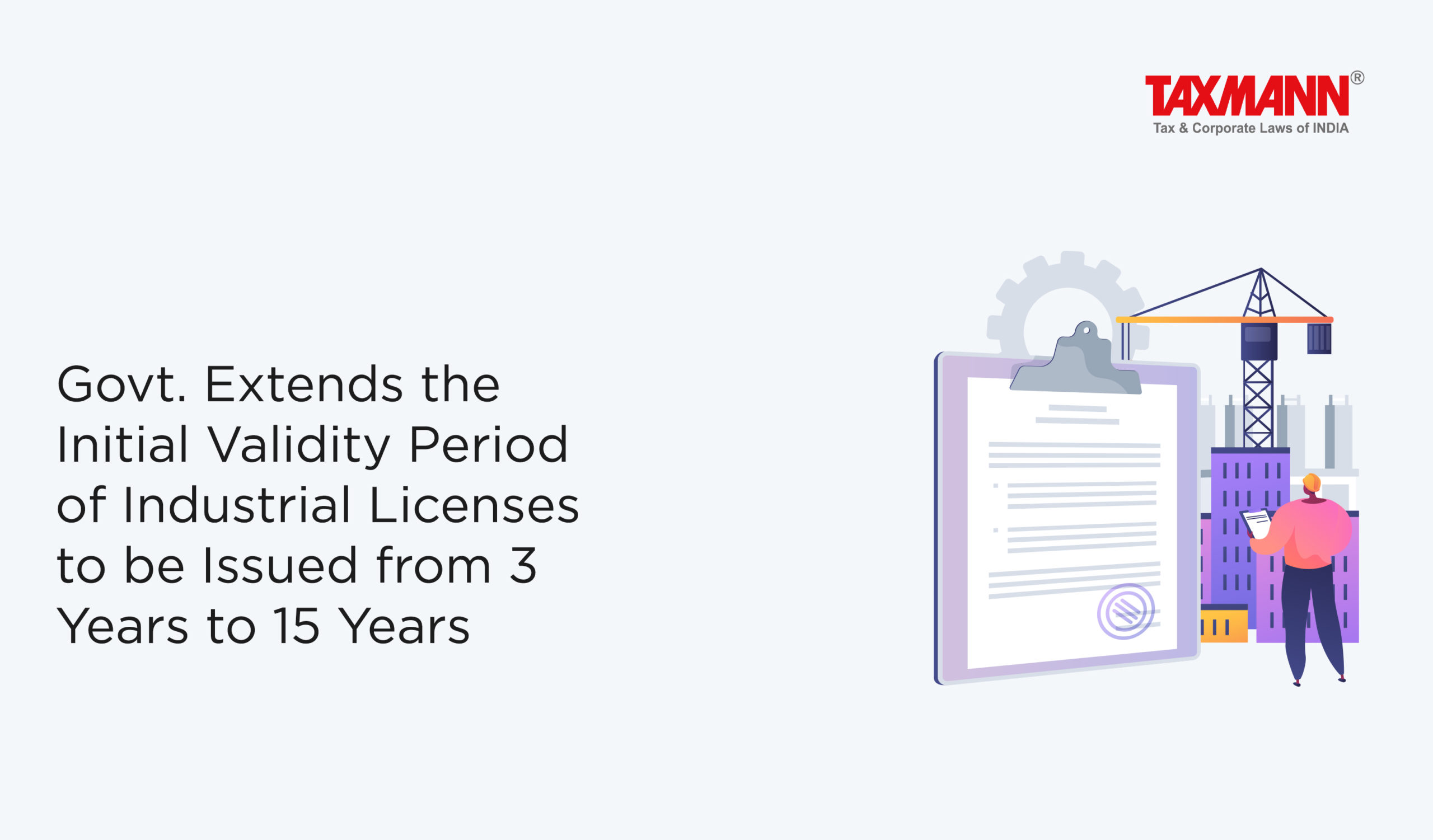Govt. Extends the Initial Validity Period of Industrial Licenses to be Issued from 3 Years to 15 Years
- Blog|News|Indian Acts|
- 2 Min Read
- By Taxmann
- |
- Last Updated on 25 July, 2023

Press Note No. 1 (2023 Series), Dated: 21.07.2023
The Government has extended the initial validity period of industrial licenses to be issued from 3 years to 15 years for all kinds of licenses under the IDRA, aligning with the validity of licenses issued for defence items. Further, the Govt. has issued revised guidelines for an extension of the validity of both new and existing industrial licenses. These guidelines apply to cases where the existing license holder has not commenced production within 15 years of the issue of the license.
The revised guidelines are as follows –
(a) The application for an extension of the license must be submitted to the concerned Administrative Ministry/Explosive Section (DPIIT), prior to the expiry of 15 years period or otherwise specified for commencement of commercial production.
(b) At the time of applying for the grant of extension of validity of the license the condition and status of the firm must be the same as mentioned in the Industrial License issued to the firm. Thus, any amendment, viz, changes in the name of the company, change in the Board of Director, increases/changes in license capacity, alteration or change in the premises, part shifting etc. must have been endorsed in the License.
(c) Applicant’s request must be forwarded to the concerned Central/State Government, as the case may be, and after obtaining comments of the Central/State Government, the case should be considered for extension of validity.
(d) Applicant must meet the following conditions at the time of applying of extension/reconsideration –
-
-
- Land must have been acquired, either under ownership or on lease for a minimum period of 30 years (as per registration/lease documents)
- The construction on the project must have been completed
- Plant and machinery for the project must have been installed/commissioned.
-
(e) Cases involving transfer, suspension or cancellation of license in the intervening period shall not be considered for extension.
(f) Extension of validity of existing license would be allowed on receipt of application from license holder within 15 years period from issuance of Press Note 5 (2014 series) i.e. 2nd July 2014.
(g) Extension of validity of new licenses, to be issued as per this Press Note, would be allowed for a further period of 3 years (up to a maximum of 18 years of validity).
(h) Any Industrial License, wherein commercial production has not started even within the extended period (15+3 i.e. a maximum period of 18 years from the date of issue of license), shall be treated as automatically lapsed.
(i) The applicants fulfilling the above guidelines may be granted an extension of Industrial License with the approval of the concerned Additional Secretary/Joint Secretary of the Administrative Ministry/Explosive Section (DPIIT) without referring the application to Licensing Committee.
Click Here To Read The Full Press Release
Disclaimer: The content/information published on the website is only for general information of the user and shall not be construed as legal advice. While the Taxmann has exercised reasonable efforts to ensure the veracity of information/content published, Taxmann shall be under no liability in any manner whatsoever for incorrect information, if any.

Taxmann Publications has a dedicated in-house Research & Editorial Team. This team consists of a team of Chartered Accountants, Company Secretaries, and Lawyers. This team works under the guidance and supervision of editor-in-chief Mr Rakesh Bhargava.
The Research and Editorial Team is responsible for developing reliable and accurate content for the readers. The team follows the six-sigma approach to achieve the benchmark of zero error in its publications and research platforms. The team ensures that the following publication guidelines are thoroughly followed while developing the content:
- The statutory material is obtained only from the authorized and reliable sources
- All the latest developments in the judicial and legislative fields are covered
- Prepare the analytical write-ups on current, controversial, and important issues to help the readers to understand the concept and its implications
- Every content published by Taxmann is complete, accurate and lucid
- All evidence-based statements are supported with proper reference to Section, Circular No., Notification No. or citations
- The golden rules of grammar, style and consistency are thoroughly followed
- Font and size that’s easy to read and remain consistent across all imprint and digital publications are applied



 CA | CS | CMA
CA | CS | CMA
